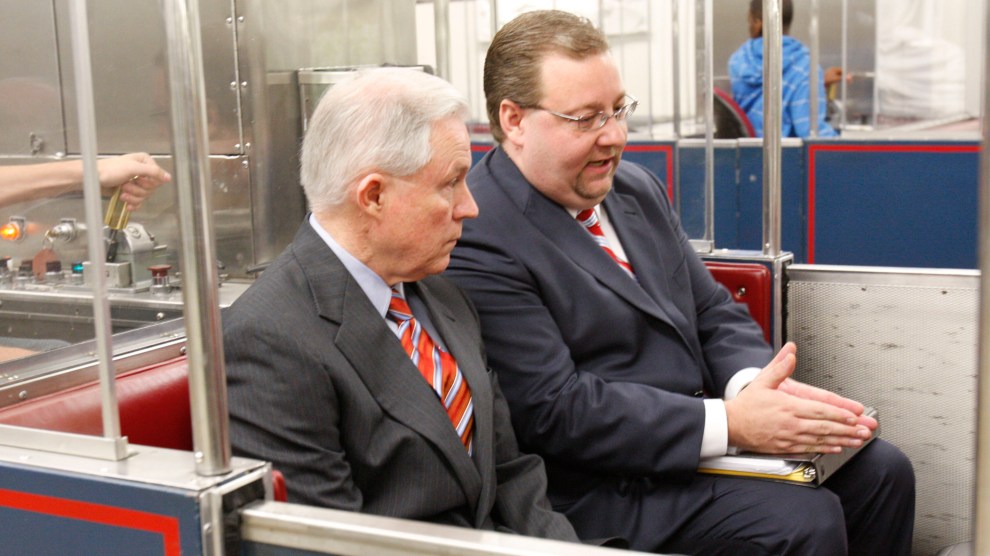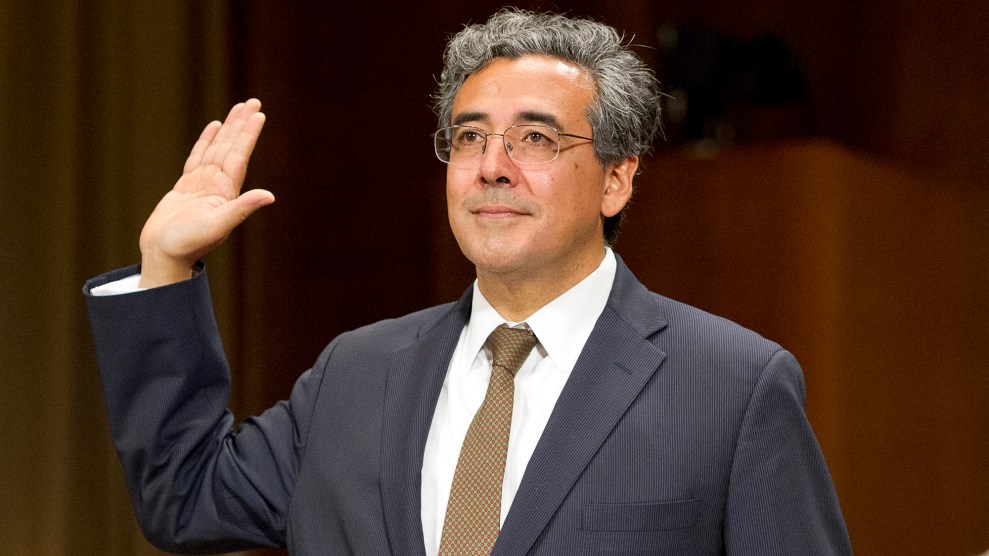
Brian Benczkowski, nominated to a top Justice Department post, speaking with his former boss, then-Sen. Jeff Sessions, on Capitol Hill in June 2009. Harry Hamburg/AP
The FBI raid of the home, office, and hotel room of President Donald Trump’s personal attorney has prompted speculation that Trump may fire top Justice Department officials in an attempt to gain control over the special counsel investigation into Russian meddling in the 2016 election. One official who could end up with significant power over the investigation is Trump’s nominee to lead the department’s criminal division—a man with no prosecutorial experience who has worked on behalf of a Russian bank with ties to Vladimir Putin.
The Senate is currently considering the nomination of Brian Benczkowski to run the criminal division, which has jurisdiction over criminal laws like those explored in the special counsel probe and a say in US attorney actions like the search warrant for Trump’s lawyer, Michael Cohen. Benczkowski, a former congressional aide to Attorney General Jeff Sessions, would come to the job with an unusual résumé. Unlike all his recent predecessors, he has never been a prosecutor and has virtually no experience in criminal law. Moreover, he was recently a lawyer for Alfa Bank, run by oligarchs with connections to Putin. This background, along with his close ties to Sessions and the Trump team, has Democrats worried that Benczkowski’s appointment could interfere with special counsel Robert Mueller’s Russia investigation.
“This nomination has to be seen in the context of a sustained and concerted and coordinated effort to undermine and undercut this special counsel investigation,” Sen. Richard Blumenthal (D-Conn.) said at a hearing in January, when the Senate Judiciary Committee approved the nomination on a party-line vote. “This nomination directly imperils Robert Mueller’s…pursuit of collusion between the Trump campaign and Russian meddling, as well as obstruction of justice.”
Benczkowski’s nomination has stalled since January, when Sen. Cory Gardner (R-Colo.) placed a hold on all Justice Department nominees. (Gardner made the move in a rare show of Republican defiance against Sessions for rescinding an Obama-era policy that allowed his state and others to effectively legalize marijuana.) It’s unclear when the Senate, which has prioritized approving judicial appointments, will return to confirming Justice Department officials, but the department currently lacks a large number of top-ranking officials whose nominations have languished in recent months.
If confirmed, Benczkowski would arrive at the job at a critical time for the Mueller probe. Sessions recused himself from the investigation, though he has involved himself in matters related to the probe, in apparent violation of his recusal. Deputy Attorney General Rod Rosenstein, who personally approved the raid on Cohen, is currently overseeing the probe, but Trump has mulled firing him. The third-ranking Justice Department official, Rachel Brand, who would inherit oversight of the investigation if Rosenstein were removed, left her post early this year, and it still has not been permanently filled. The person next in line to oversee the investigation is Solicitor General Noel Francisco, a conservative lawyer who has expressed skepticism in the past of special counsel investigations.
But if Rosenstein is fired, there are other ways Trump could fill the leadership void. One would be to put Benczkowski in Brand or Rosenstein’s position, giving him control over the special counsel investigation. The Federal Vacancies Reform Act allows the president to temporarily appoint any Senate-confirmed official to another administration job. If Trump deems Benczkowski sufficiently loyal to the administration, he could potentially see the criminal division chief as the safest bet.
Even if Rosenstein retains oversight of the probe, Democrats on the Senate Judiciary Committee warn that Benczkowski could undermine the investigation from his perch atop the criminal division. Sen. Sheldon Whitehouse (D-R.I.) has asked Rosenstein repeatedly for an explanation of who at the Justice Department has access to information about the Mueller investigation. In response, Justice Department official Stephen Boyd wrote to Whitehouse in December that special counsel regulations require Mueller to “‘consult with appropriate offices within the Department for guidance'” on the rules and procedures of the department. That suggests that Benczkowski could have significant insight into the investigation, and even some control over aspects of it.
There is no special setup to wall off Mueller’s work from other components of the Justice Department, Boyd wrote. Mueller may have to seek approval for some actions through the same channels that a US attorney would, including from the criminal division. “[T]o ensure that information about the investigation is not disseminated more broadly than necessary, the Criminal Division has identified specific points of contact for the [special counsel’s office] with respect to various subject matters,” Boyd wrote. If confirmed, Benczkowski would have “no supervisory role with respect to the Special Counsel,” Boyd stated, but added, “it is possible that the [special counsel’s office] will seek approvals from the Criminal Division as required by statute, regulation, or policy.”
Whitehouse worries that this arrangement could jeopardize Mueller’s probe. It would give Benczkowski “a window into the investigation,” he told the Washington Post last month. “I remain concerned he could provide a back channel to his old boss and to the man in the Oval Office who’s declared open war on the Mueller investigation, and that procedures in place are not adequate to detect or prevent this.”
The Justice Department pushed back on this speculation. “Brian is a talented and well-regarded lawyer with extensive experience at the Department of Justice, the Bureau of Alcohol, Tobacco, Firearms, and Explosives, and in private practice on matters of criminal law,” Justice Department spokeswoman Sarah Isgur Flores told Mother Jones in response to questions about Benczkowski’s lack of criminal experience and representation of Alfa Bank. She said that questions about Democrats’ concerns that Benczkowski could share information with Sessions or the White House are “insulting and absurd.” She added, “Brian has dedicated over a decade of his career to public service and has done so with integrity. Insinuation of professional misconduct absent any proof whatsoever should have no place in serious journalism.”
After working several jobs in the Justice Department during the George W. Bush administration, Benczkowski became staff director of the Senate Judiciary Committee when then-Sen. Sessions was the committee’s ranking Republican. In 2010, he left the government to become a partner at the law firm Kirkland & Ellis.
After the election, Trump tapped Sessions as attorney general and Benczkowski came on board to run the Justice Department transition team. When the transition ended, Benczkowski put in a personal request with Sessions for a posting as a US attorney, then returned to his law firm to await a likely appointment in the new administration. In April, he received word that he was being considered to run the Justice Department’s criminal division.
A month earlier, Benczkowski had taken on a controversial client: Alfa Bank, one of Russia’s largest financial institutions. In late October 2016, Slate reported that the bank and the Trump Organization had a high volume of connections between their computer servers. But the FBI had investigated the link and concluded there could be an innocuous explanation, according to the New York Times. Alfa Bank hired an outside firm, Mandiant, to study the data transmissions. With the limited data the firm was given, it found no evidence of substantive contact between the bank and the Trump Organization.
But in the first months of 2017, Alfa Bank’s server again logged suspicious traffic potentially connected to the Trump Organization. This time, Alfa Bank turned to Kirkland & Ellis, where Benczkowski took the case. His job was to oversee a second investigation of the new server connections, which was conducted by a different forensics firm, and to bring the results to the FBI and Justice Department. Benczkowski was in the midst of this effort when he was nominated to lead the criminal division. At his confirmation hearing, Benczkowski promised to recuse himself from any matters relating to Alfa Bank for two years, the minimum required, but not from the ongoing Russia investigation. The report overseen by Kirkland & Ellis again found no evidence of contact between Alfa Bank and the Trump Organization. The suspicious traffic appeared to come from fake host names that contained the word “Trump,” according to Kirkland & Ellis partner Viet Dinh.
Democrats say they see the Alfa Bank case as an indication of poor judgment. Why, they wonder, did Benczkowski take on Alfa Bank as a client given his likely nomination to a Justice Department position? This “may not reflect mischief on your part but may well reflect an effort at mischief on Alfa Bank’s part,” Whitehouse observed during Benczkowski’s confirmation hearing. “They are a part of the oligarch establishment of Vladimir Putin, and they know you were leading the transition team, they come to your firm and somebody asked for you.”
Benczkowski’s representation of Alfa Bank also brought him into contact with another piece of the Russia investigation: the Steele dossier. The dossier, a compilation of uncorroborated reports about Russian interference in the 2016 election produced by British ex-spy Christopher Steele and first reported on by Mother Jones, looms large in Mueller’s investigation. Several House and Senate Republicans have attempted to impeach Steele’s credibility in an attempt to derail the investigation. In January, much of the dossier was published by BuzzFeed.
One of its reports alleges a close relationship between Putin and Alfa Bank. According to the dossier, Putin has leverage over the bank’s owners and receives informal advice about the United States from two of the three oligarchs who run the bank, Mikhail Fridman and Petr Aven. In his role as counsel for Alfa Bank, Benczkowski reviewed this portion of the dossier after it was published and advised Fridman and Aven on the viability of a defamation suit against BuzzFeed. In May, Fridman, Aven, and the third owner, German Khan, filed their suit against BuzzFeed. In October, they filed a second defamation suit against the opposition research firm Fusion GPS and its co-founder, Glenn Simpson, who hired Steele to look into connections between Trump and Russia. Benczkowski’s firm is not representing them in these suits. At his hearing, Benczkowski testified that his work on this issue was minimal.
“I read the two pages of the dossier that were published online, on BuzzFeed,” Benczkowski said during his confirmation hearing. He described his job as “simply to review those facts, assume that they are false, and then give the client preliminary advice about whether they should move forward in thinking about a defamation action. I can’t reveal what that advice was.”
Benczkowski says taking on this client was business as usual for him, because his specialty at the firm was corporate internal investigations. He has denied that there was anything untoward about his nomination. At his confirmation hearing, Sen. John Kennedy (R-La.) asked him bluntly, “Are you being hired to interfere with that investigation?” He responded that he was not, adding, “And if I were asked to do anything like that, I would steadfastly refuse.”
















